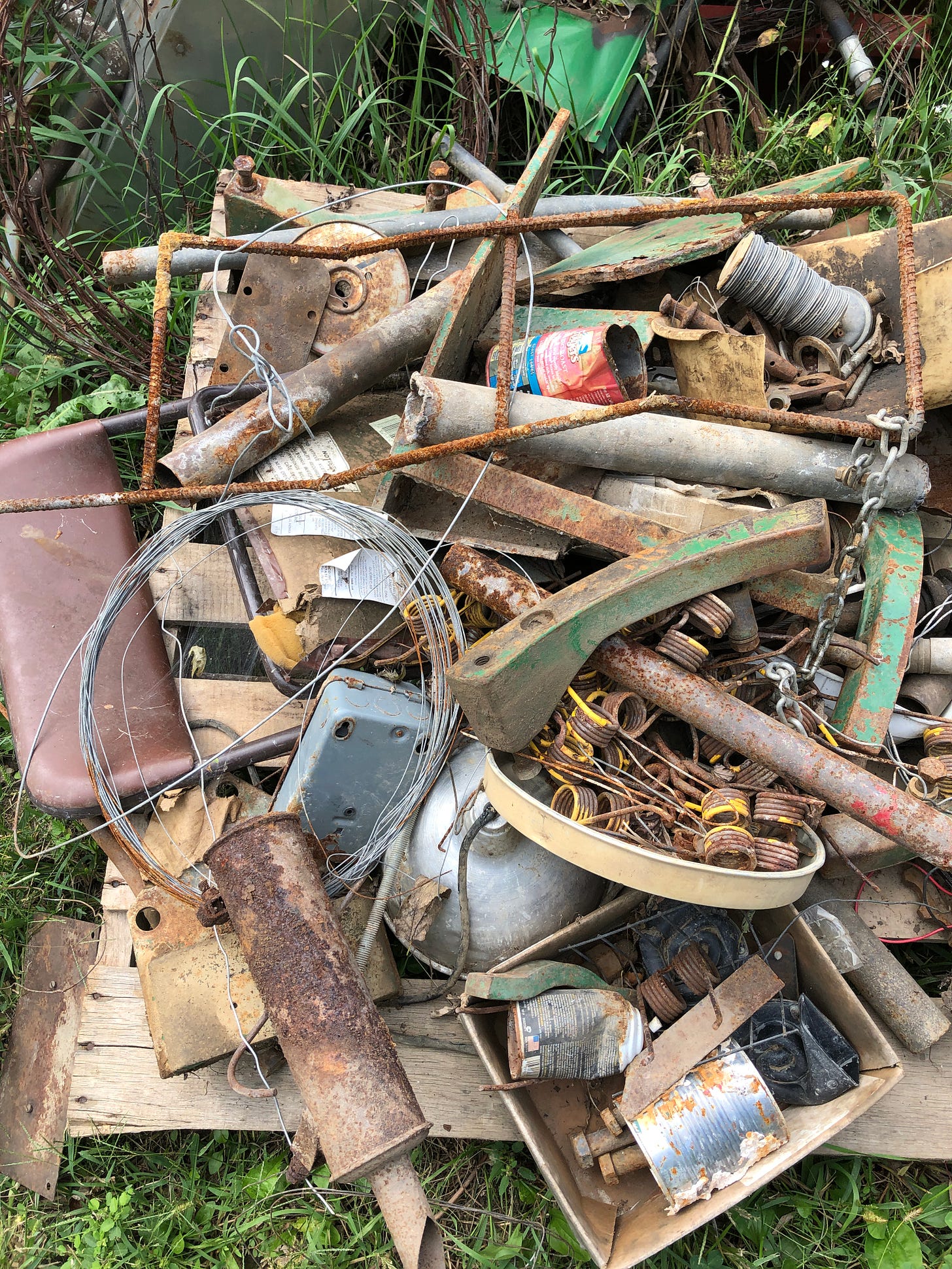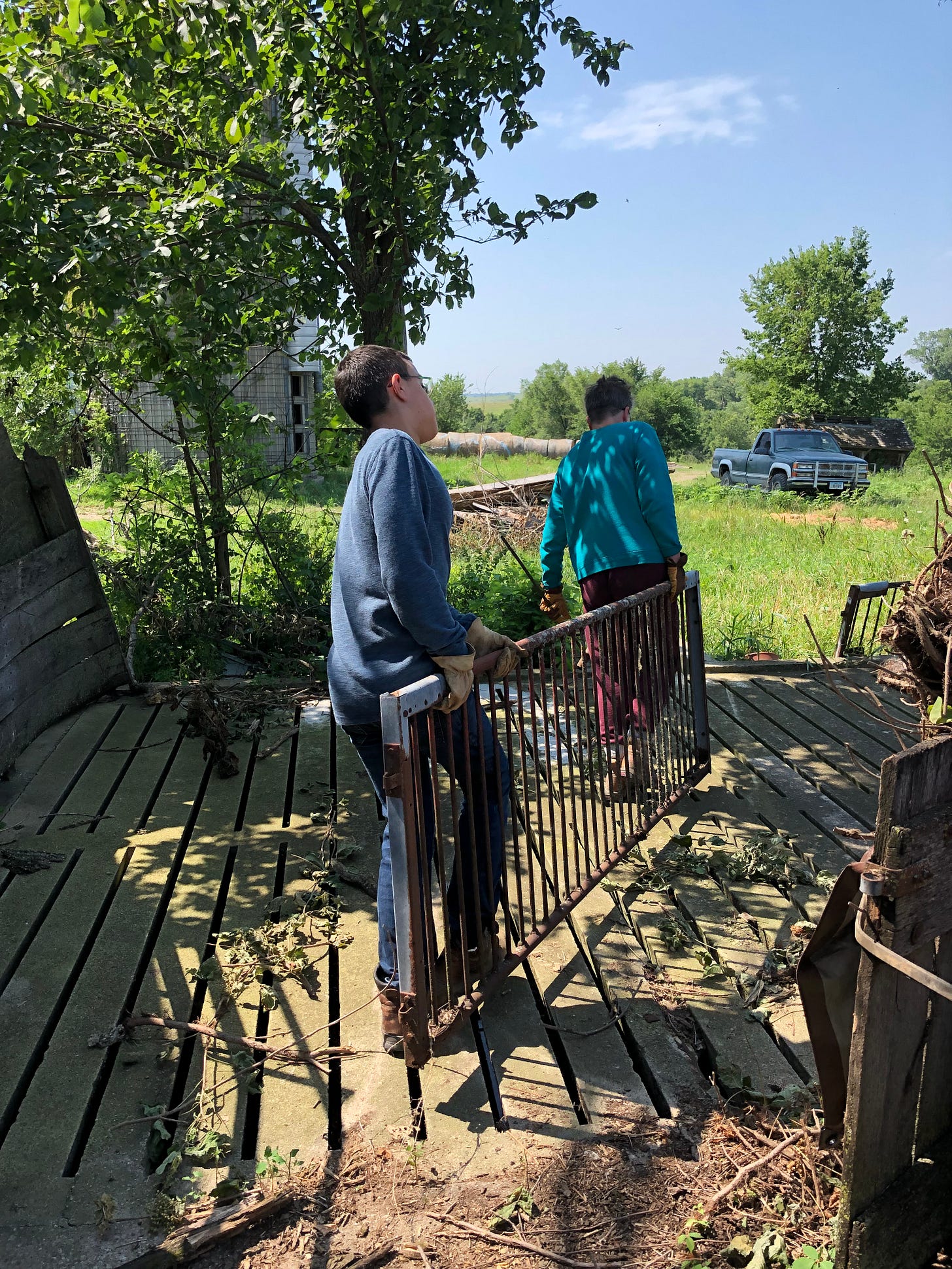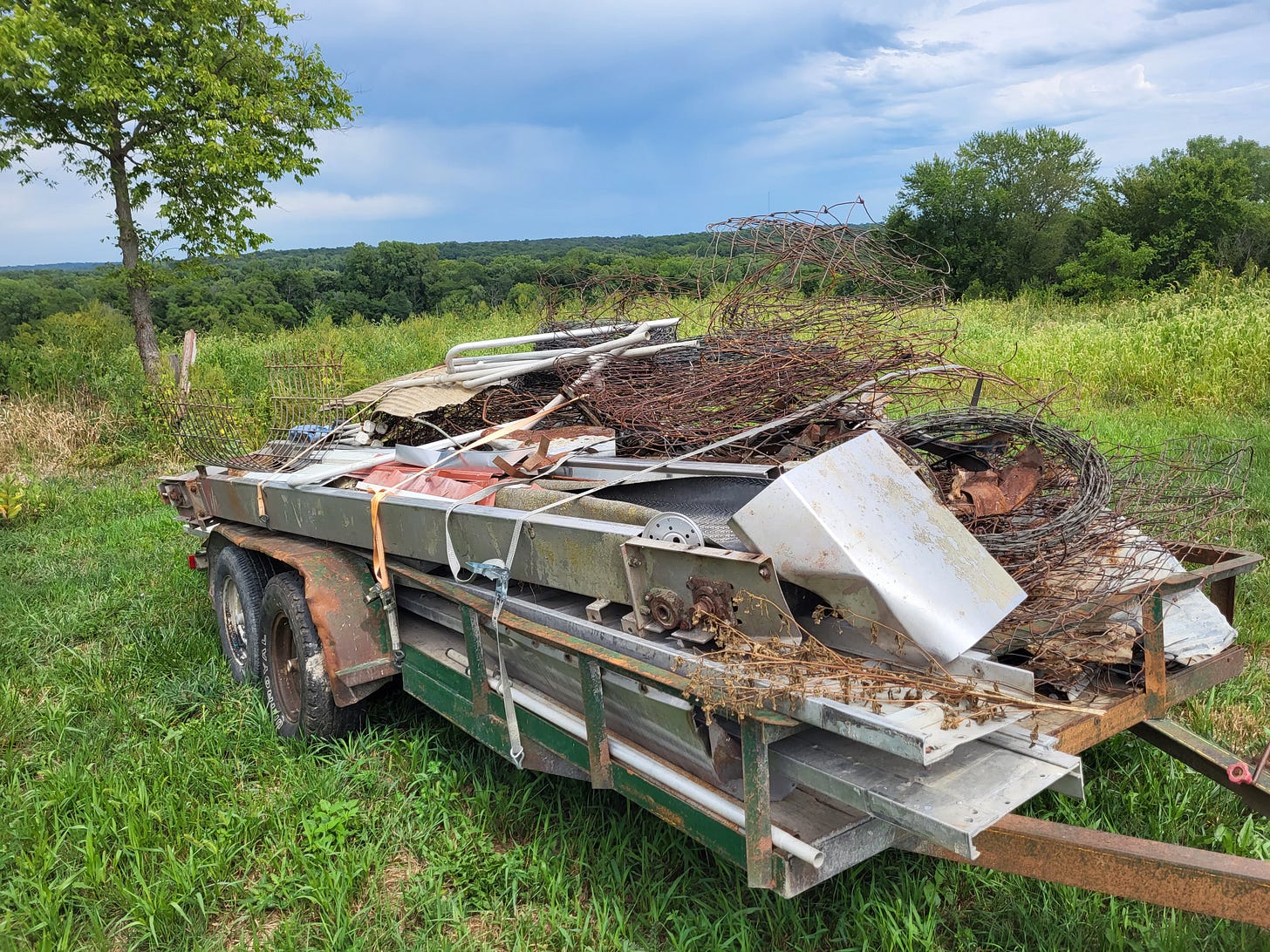Here’s something I think about all the time while working on our farm: trash. Not “trash" as in how much manure is generated by animals (there is a lot, but we move our cattle and goats many times a week and they are on pasture 365 days a year, so there is no one spot inundated with shit as it is in a feedlot). Nor do I think too much about the kinds of garbage many of our neighbors produce in their corn and soybean operations–the sacks of seed bags and giant plastic jugs of chemicals they use–although probably I should think about that more.
No, it is the trash that has been dumped on the farm by humans over the past many decades that occupies my thoughts. Old machinery parked in the field for that “someday” someone might need it, now rusted with trees growing through it. Concrete painstakingly poured by one generation, then dug up by bulldozers and dumped into the creek three decades later. All those plastic oil bottles, the bolts, and nuts used a generation ago, the broken axle, and the car sitting in the field. Oh and the tires. Don’t forget the dang tires (sigh).
My husband John grew up on the farm, and reports that the volume of crap tossed into the fields and waterways exploded between the time of his grandfather and our time now as caretakers of the land. Early on, John’s grandpa only threw away glass bottles and porcelain crocks–there was no plastic to flippantly toss aside, and metals were too scarce to think about chucking into the creek. But over the past 70 years, John’s dad–like most Americans–learned they could easily buy things and use them until they broke, then toss them aside. The fixing of plastics and much of the machinery cost more than buying a new one to replace the old.
But even with the best of intentions and less consumerism, much of farming amounts to a redoing and undoing of human work. I think about the hoards of energy it took farmers to erect a fence: to cut the wooden posts, dig the holes, and string the wire. Now we spend hoards of energy undoing it, rolling up the barbed wire that snags wildlife, pulling the old posts, augering in new ones.
I try to picture the resources spent to mine the steel used to build a baler or an auger. How the machine was trucked to the farm to use in the fields, then later, when the item grew obsolete in the face of “progress” it was heave-hoed into the ditch. More gas and time are now spent trying to get it back out, the tractor precariously perched on the bank of the waterway, the log chain links wrapped around the old baler as it sways like a giant cat toy in the air. Even more labor and money is spent carting the rusty heap over to the scrap metal yard where it is laid to rest, at least for now, and where we receive fractions of pennies per pound for the item and for our work.
Sometimes, I think I’d like to go back in time to the moment when the horse-drawn reaper was discarded where it stands today; so long ago that the years of water and mud have enveloped it so deeply in the dirt that it is unmovable, even by tractor. Can you please not leave the equipment right here in the wetland area? I would ask.
I would explain to John’s dad–the one who threw the hog feeders into the creek–that we will want to take care of the drainage in a different way in the not-so-distant future, a future we envision where the hog feeders would be a nuisance.
But realistically, my pleas probably wouldn’t have done much good. Trash pick-up is too expensive when you are making nothing and have a lot of land on which to do what you want. The value of scrap metal would not have paid for the gas to truck it in. It was–and is–not only the mentality that the discarded machinery was his to do with what he wanted, but also that the land is plentiful and resilient enough to toss, pour, spray, and throw whatever we desire into its lap.
But of course, we can’t undo the past, only work to remediate it in the present. Like most things, denying it never happened won’t help; the scars on the landscape or in our hearts is there whether we acknowledge it or not. And continuing to act in ways that continue to do harm also does not take into account the current status quo, where erosion is real and polluted water an issue millions face.
So we work to make things better, to repair, to replace the fence where we found a dead hawk stuck in the barbed wire with a more “animal-friendly” fence. To dispose of the chemicals left in the shed for the past 60 years in a proper manner (if there is one), to cart the tires to the landfill instead of looking at them in the field.
Yet it makes me wonder what agriculture would be like if farmers too adopted the old adage of doctors– “first do no harm.” What if making sure that future generations don’t have to clean up a mess was a guiding principle in agriculture? If taking care of one’s own mess was the Golden Rule? It’s a basic principle we all should have learned in Kindergarten, but so many fail to adhere to it in our adult lives.
As Neil Hamilton points out in his book, after each of us is done farming and we are long gone, the Land Remains. It could remain metal and plastic free too.
I’m honored to be a part of the Iowa Writers Collaborative and thrilled that the Iowa Capital Dispatch is featuring some of our work. The Iowa Capital Dispatch is part of States Newsroom, a nationwide effort to bring thoughtful and honest reporting to everyone.
Here are the members of the Iowa Writers Collaborative in alphabetical order.
Laura Belin: Iowa Politics with Laura Belin
Doug Burns: The Iowa Mercury
Dave Busiek: Dave Busiek on Media
Art Cullen: Art Cullen’s Notebook
Julie Gammack: Julie Gammack’s Iowa Potluck
Beth Hoffman: In the Dirt
Dana James: New Black Iowa
Robert Leonard: Deep Midwest: Politics and Culture
Chuck Offenburger: Iowa Boy Chuck Offenburger
Mary Swander: Mary Swander’s Buggy Land
Ed Tibbetts: Along the Mississippi
Iowa Writers Collaborative: Iowa Writers Collaborative
Support our work if you can. Be a part of the team. Thank you.








Thanks Joe! We have taken chemicals to the county landfill where they are put into the "correct" disposal area. But many of the containers are unmarked or are chemicals they don't accept. And don't get me started on all those tires! Ugh.
Thanks for reading.
Beth
Thank you, Beth. There is a proper and legal way to dispose of the old chemicals. In our area, we take them to the special waste recycle place in Council Bluffs. https://publichealth.pottcounty-ia.gov/recycling/ Most small Iowa counties do not have such.
Several years ago, when we took a load of old unused pesticides there, I was told that they were destined to be incinerated up in the Dakotas. We all hope that is the best remedy, of course. Perhaps there is a better method now.
Joe Wearin
Hastings, Iowa